The United States housing crisis is not new. Even before the coronavirus pandemic, 10-15 percent of households reported being housing insecure. Now, with unemployment at historic highs and more than 20 million individuals out of work, the country’s housing crisis is only getting worse. In April 2020, 1 in 3 Americans did not pay rent, and, despite moratoriums to protect against evictions, renters are still being evicted.
Groundbreaking data from a new large-scale, nationally representative survey of low- and moderate-income (LMI) households (representing roughly 60 percent of the overall U.S. population) administered by the Social Policy Institute at Washington University in St. Louis in April of 2020 suggests that individuals have been facing increased housing hardship such as evictions, delayed rent or mortgage payments, and unexpected utility payments and home repairs during the pandemic. Particularly at high risk for evictions are Hispanic/Latinx populations (Figure 1), who are already more likely to be low-income and to become infected with COVID-19 compared to white populations.
Figure 1. Eviction experience during the COVID-19 pandemic

Source: COVID-19 Survey, Wave 1 (Apr 22 2020 – May 12 2020), Social Policy Institute.
Notes: LMI only. N=2,680.
Over the past three months, alarming and devastating statistics from this new study show the challenges LMI homeowners of Hispanic and Latinx communities are facing during the pandemic. For example:
- Twenty percent of Hispanic/Latinx homeowners did not pay the full amount of their mortgage, which is nearly two times greater than the entire sample (10.4 percent) during the COVID 19 pandemic (Figure 2).
- One in five LMI Hispanic/Latinx homeowners skipped a bill or paid a bill late (Figure 3).
- Seventeen percent of these individuals had an unexpected major house or appliance repair, straining their already tenuous financial situation during the pandemic (Figure 3).
In addition to homeowners, renters have been especially hit hard by the pandemic. Historically, LMI renters face great challenges of finding affordable housing, sometimes spending over half their income on housing alone. COVID-19 has exacerbated this crisis.
Figure 2. Delinquency experience during the COVID-19 pandemic

Source: COVID-19 Survey, Wave 1 (Apr 22 2020 – May 12 2020), Social Policy Institute.
Notes: LMI only. N=2,672.
Figure 3. Utility payment delay and major home repairs during the COVID-19 pandemic

Source: COVID-19 Survey, Wave 1 (Apr 22 2020 – May 12 2020), Social Policy Institute.
Notes: LMI only. N=2,677.
Data from the survey highlights how almost 30 percent of LMI individuals have lost their job, and 44 percent of LMI individuals have experienced a decrease in work hours as a result of the pandemic. Many survey respondents cited a requirement to be physically at their job as the reason.
Renters are also unlikely to have any emergency or “rainy day funds” set aside for savings or unexpected situations such as the pandemic. More than 40 percent of LMI survey respondents said they had no emergency savings set aside, and more than 12 percent of LMI individuals said they would not be able to pay for a $400 emergency expense. This is particularly alarming, as these rates will likely be compounded when unemployment benefits for LMI individuals end.
Moving from a “Band-Aid” to a long-term solution
The Senate’s $2 trillion coronavirus aid package signed into law on March 27, 2020 (the CARES Act), aimed to provide direct relief to low-income individuals. However, The CARES Act has functioned more like a “Band-Aid solution,” serving as a temporary response to a problem that spans larger than the coronavirus pandemic. Even so, the CARES Act has not equitably helped all those who need it. Data shows that almost 40 percent of LMI Black and Hispanic households and over 30 percent of LMI white households who qualified for cash relief through the CARES Act had still not received their payment at the time of the survey’s administration.
Part of the CARES Act included legislation to prevent evictions on a federal scale, but data from the Social Policy Institute survey shows that this was not the case (Figure 4). Non-Hispanic white respondents have not been spared either—only 5 percent and 6 percent of LMI white individuals benefited from mortgage/rent payment deferral or banned utility shutoffs during the pandemic, respectively. Experiences with evictions, foreclosures, and utility shutoffs are likely to increase rapidly as moratoriums end across the country.
Figure 4. Receipt of CARES Act benefits during the COVID-19 pandemic

Source: COVID-19 Survey, Wave 1 (Apr 22 2020 – May 12 2020), Social Policy Institute.
Notes: LMI only. N=2,680.
The CARES Act was limited in its effectiveness. It froze evictions for only specific types of housing, such as public housing and homes with federally supported mortgages, but policy should go further to support all renters and homeowners for the long term. Indeed, our survey shows that 4 percent of our entire sample, not just LMI, experienced evictions, and 9 percent were behind on their rent or mortgage payments.
The voucher system needs stronger federal support, too. Prior to the pandemic, it often took years for qualified individuals to receive their vouchers. This has always been a problem for LMI households, but housing programs and vouchers are even more vital now, in the wake of the pandemic. One solution is to fully fund the housing choice program and payments should be streamlined to landlords to incentivize their participation.
We must invest in low-income, under-resourced communities through housing revitalization efforts, education systems, and federally qualified health centers. While this survey focused primarily on renters and homeowners, legislators must also mobilize efforts to provide stable housing to unhoused populations during and beyond the pandemic.
The COVID-19 pandemic is bringing to light an existing housing crisis
Since long before the pandemic, low-income individuals have been experiencing great levels of hardship regarding their housing stemming from finances, ranging from the physical condition and multi-generational housing environments to a lack of community supports such as access to healthy food options and proximity to health care services. Add the coronavirus to the mix, and we are seeing exacerbated housing-related disparities. Moreover, we also have learned that housing-related inequalities have amplified the risk of COVID-19 infection as well as chronic conditions (e.g., asthma) that increase the risk of complications due to COVID-19, including death.
Our survey results suggest that, while the entire U.S. population is facing increased housing risk, certain groups are bearing disproportionate levels of housing hardship, including Latinx/Hispanic populations. Understanding the particular needs of this group will be important in enacting policies and practices to support them. For example, undocumented populations may be particularly vulnerable to evictions and rent theft. Moreover, there are other populations that may be at risk such as individuals who have been recently released from prison and the unhoused, many of whom may be doubling up in already space-strained households, and at the same time are more likely to have been exposed to the virus and therefore advance its spread.
Now that the coronavirus pandemic has brought these stark inequities to light, it is imperative that legislators enact policies to ensure that low- and moderate-income individuals have access to high-quality and stable housing. It is impossible to have discussions about a recovery from the pandemic without realizing how housing is a core aspect and inextricably linked to outcomes and predictors of an individual getting the coronavirus—including preexisting health conditions, ability to social distance, and access to health care. Beyond housing’s direct impact on low- and moderate-income individuals during the coronavirus pandemic, housing is a basic need that individuals—regardless of income—need and deserve.
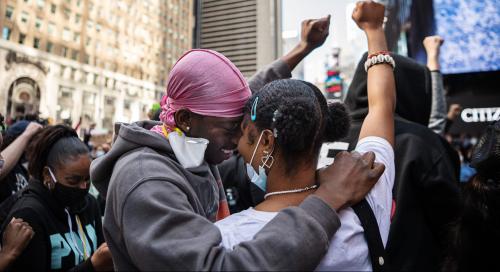
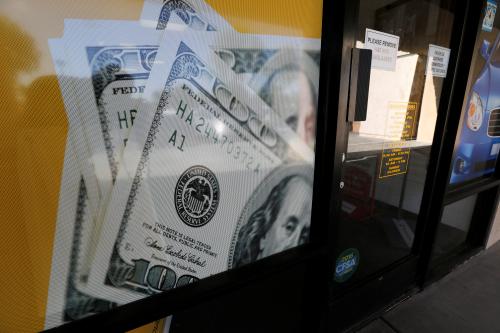
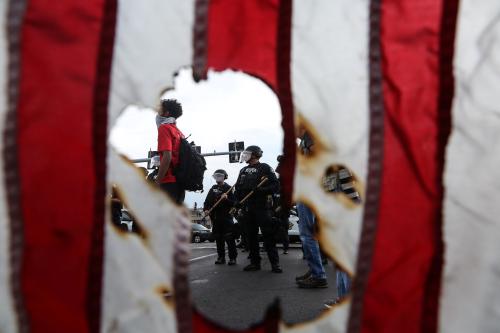





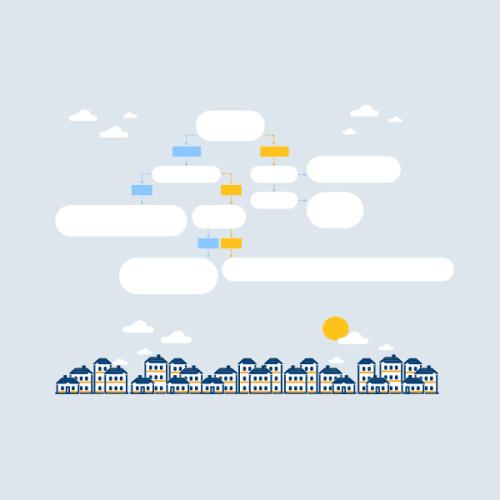

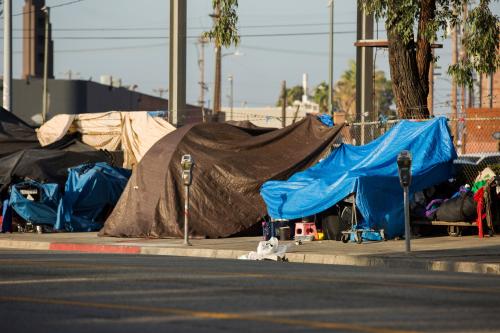
Commentary
Housing hardships reach unprecedented heights during the COVID-19 pandemic
June 1, 2020